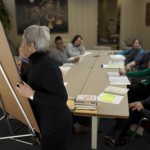Congratulations to Peter Yakimowich, Carter Paden and Aaron Bridgers-Carlos, graduates of the PDRS Training Institute, who recently were awarded Tennessee Supreme Court Rule 31 Listing by the Alternative Dispute Resolution Commission. We also want to congratulate Bonnie Woodward-Weller for obtaining her Family Mediator Listing. For more details on obtaining Tennessee Supreme Court Rule 31 and Listing, click here
The PDRS Institute will hold its next mediator training March 23-27 in Chattanooga. Click here to register,
